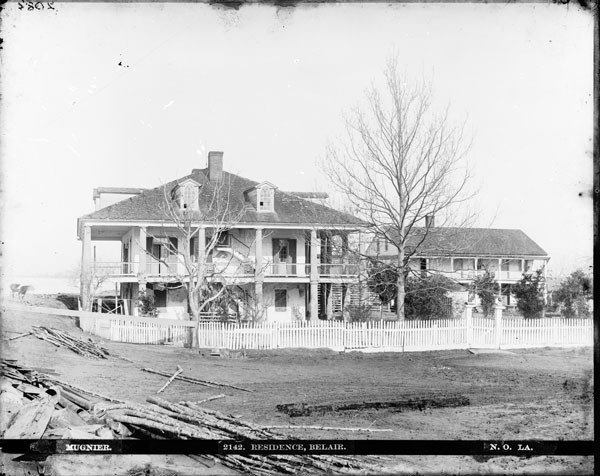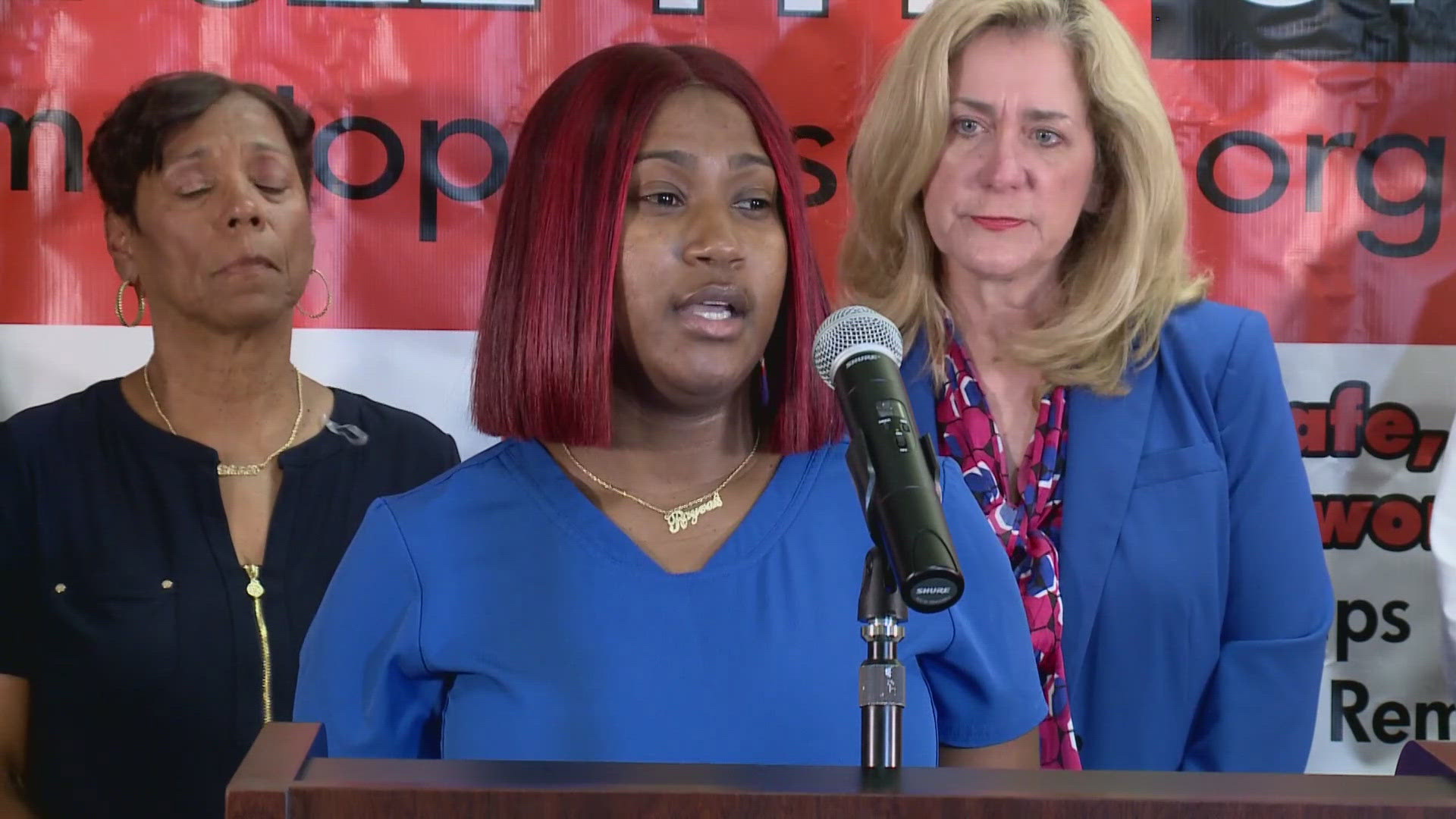This small south Plaquemines Parish town, and the large surrounding levee system, are named after Hubert Burat, who, along with his heirs, owned thousands of acres of mineral rich lands near the mouth of the Mississippi River.
But the heirs, who changed their name to Buras, have enjoyed little of the riches and power that came with the oil later discovered under their patriarch's properties.
The Buras heirs say they have been threatened, and some of their ancestors possibly even killed, as the parish's most powerful figures seized Hubert Burat's lands, tract by tract.
Family lore zeroes in on one incident in particular from around 1930, when the strong-armed parish boss, Leander Perez, allegedly showed up at the family ranch on Spanish Island. As the late Chauvin Buras told his relatives, Perez and another man approached his grandmother on the porch while the men were out hunting.
"He put the gun to her head and said, 'I want the deeds to the property,'" said Kenneth Harvey, Chauvin Buras' cousin. "He said, 'I'm gonna take it to Baton Rouge to change it.' And when he came back, we didn't have the land."
And just in the last year, a new slap in the face from a familiar foe: The heirs of Leander Perez have filed a so-called "legacy lawsuit" seeking damages for contamination to property – property for which Wilfred Buras holds the original Spanish land grants and patents.
The Perez family never owned the land, but leased its mineral rights through the company Leander Perez secretly controlled, Delta Development, using a scheme later deemed fraudulent in court.
Still, the infamous boss' descendants are among those who have filed more than 360 lawsuits against the oil and gas companies that have operated on these lands for decades.
John Carmouche, the Perez heirs' attorney for their legacy claim, contends it doesn't matter who owns the land, as long as the lawsuit gets it cleaned up. But as WWL-TV's series "Tainted Legacy" has shown, legacy lawsuits, the majority of them filed by Carmouche, are more than just mechanisms for cleanup.
They regularly yield tens of millions of dollars in damages for claimants, on top of the state-monitored costs oil and gas companies must pay to remediate environmental violations.
Wilfred Buras says he was sickened to learn of the Perez damage claims on about 20 percent of the 572 acres once granted to his great-great grandfather, C.B. Frederick.
"They don't even have title to the property," he said. "Therefore, they don't have no claims to it. They've had leases, from what I understand, and really unjustly – because they was representatives of the parish down there at the time. And therefore, what he had done was wrongfully done. Because he was supposed to be protecting the people, and evidently, he was sticking money in his back pocket the whole time."
Wilfred Buras has the original Spanish land grant for Frederick's property in Township 18 South, Range 15 East. The Perez legacy lawsuit lays claim to tracts in the same township and range.
The Plaquemines Parish Council sued Perez's Delta Development Co. in the 1980s, after Perez's son Chalin slipped up in a divorce filing and exposed the fraud that had been funneling Buras Levee District mineral leases back to the Perez family.
Former Parish President and Councilman Benny Rousselle said there is no way the Perez heirs, who were stripped of their ill-gotten mineral leases, should have legal standing to file for contamination damages to lands they never owned.
But, he said, the Buras family is still on the outside looking in. While Rousselle said he hoped the family finds justice for properties allegedly stolen from them, he doesn't think the parish can afford to cede its claims to the mineral rights to them either. "Those royalties are what run this parish," he said.
Plaquemines Parish officials are extremely protective of the parish's lucrative mineral rights, especially when its ownership could be shaky. In 1998, the parish council's attorney Kevin Conner, now a judge, warned council members not to let the public see legal opinions attached to property documents.
"I mentioned that there are some parish properties that have a cloudy title to them where the title is questionable, and that information should not be released to the general public or else it will (a)ffect our mineral rights, royalties and interest," Conner wrote.
Conner said in an interview Thursday that he was writing in the context of a property dispute at the time between the parish government and the local school board.
But the issue of cloudy title and questionable mineral rights has often popped up with lands turned over to government bodies that had flood protection responsibilities in the parish -- the Orleans Levee District, the Buras Levee District and the Grand Prairie Levee District.
State law requires levee boards and districts to return lands not in active use to the original owners. That's the law that forced the Orleans Levee Board to pay $17 million dollars to dozens of families in the late 1980s for the mineral royalties the levee board had collected for decades in the Bohemian Spillway, on the east bank of the Mississippi River.
But Rousselle said smart public officials should be able to argue that land producing oil and gas revenues for the parish is, by that very fact, in active use and helping support the parish's flood protection efforts.
The Buras family's claims on various swaths of land have proved fruitless so often since the 1950s, the heirs are convinced it's been a well-coordinated conspiracy.
Joseph Buras says he was a teen bagging groceries when he heard the fearsome Judge Perez himself say, "If the Burases knew how much land they owned, there wouldn't be a Plaquemines Parish" because of how much money that land was raking in for the parish.
That was before anyone knew the money was actually going back to Perez and his family. And Perez has continued to pop up to thwart the Buras claims, if not always as directly as when Chauvin Buras alleged the gun was pointed at his grandmother.
After that incident, the family tried to get back Spanish Island, the wagon-wheel shaped salt dome near Venice that spawned hundreds of oil wells over the subsequent decades, and millions of dollars in royalties the Buras family never saw.
Their first lawyer on the case had married into the Buras family. Unfortunately, he was also Judge Perez's cousin.
"We have paperwork from oil companies, corresponding with each other, stating that John Perez wasn't going to put up a big fight for the property," Harvey said.
Joseph Buras tells the story of how his uncle had located a copy of the old title, from before it had been altered, and found it listed in the parish's land records catalog. But when he went to the clerk's office to get a true copy that would be admissible in court, the clerk, Allen Lobrano, told him it was too late to get a copy certified and to come back tomorrow.
By then, unbeknownst to the Burases, Allen Lobrano had already signed leases on the Delta Development property, leases that the Perez family now claims in their legacy suit belonged to them. So, that's why Joseph Buras isn't surprised that when his uncle went back to the clerk's office the following day, the original Buras title had been torn out of the land books. The page has never been replaced, Joseph Buras said.
The Spanish Island wagon wheel, with oil wells marked with red.
The family sued in 1954 to get back another property, known as Cubit's Gap, from the levee district that bears the Buras name. They produced the patent from 1898 and a transfer of the deed to their direct ancestor recorded in 1899. After 16 years of fighting, the U.S. District Court in New Orleans awarded them the property in 1970, against the federal government's wishes.
But two years later, the whole thing was mysteriously reversed at the U.S. 5th Circuit Court of Appeals. Apparently, the appeals court was concerned that the court clerk in 1898 was pocketing fees instead of putting the money in the parish treasury. The appellate court decided the Buras' title had been clouded in 1903 when the new clerk -- after the crooked one had committed suicide -- granted a rival claim to Cubit's Gap.
Confused about the reversal, some family members blamed their attorney, Phillip Wittmann. Wilfred Buras thinks it's more than coincidental that Wittmann went on to become a top corporate attorney who has defended major oil companies in some of the biggest civil cases.
The family thought for sure it had broken through in the late 1980s when the Bohemia Spillway settlement was announced. Patricia Buras Wallace, one of the primary heirs, filed claims on more than 50 tracts of land there. But the response from the Louisiana Department of Natural Resources curiously addressed just 14 of them, denying them all and certifying others as the true owners.
"If you were politically joined with somebody and you were the right family, you got title to it," Joseph Buras said.
On the other hand, many of the claimants who were certified in the Bohemia Spillway settlement were poor black farmers who had even less money and power than the Buras clan and asserted their claims by working and actively possessing the land.
Recently, the Burases have had some success by actively paying taxes on properties and getting new patents issued in 1998 by the U.S. Land Office for Hubert Burat's land in Ostrica, which was held for decades by the Orleans Levee District and leased to Chevron. But when the oil company laid a new pipeline leading into its large terminal there in 2007, it paid the Buras heirs $25,000 for the right of way without a fuss.
Held back by in-fighting at times, the Buras heirs say they must come together now in a final push for their family lands.
"We'll probably be the last generation that will try to fight for this, and if we don't do something now to bring this out in the open, (others will) just go on collecting their royalties," Harvey said. "Why should the rich continue collecting, getting richer off the poor man? It has to be exposed."


